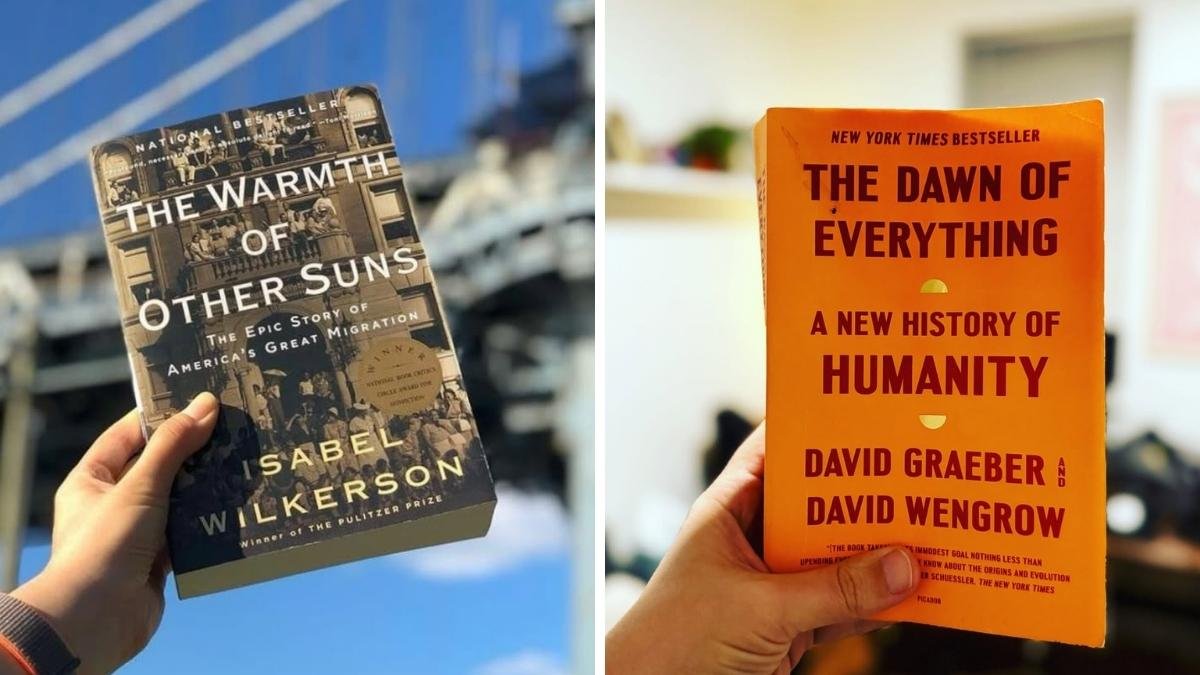
Willpower is a myth. Or at least, it’s a terrible strategy for lasting change. How many times have you sworn off sugar, only to binge on cookies by 8 PM? Or vowed to hit the gym daily, then FaceTimed your way through another week?
The truth is, willpower is like a flickering candle—bright at first, but guaranteed to die when you need it most. The real secret to transformation? Hacking your habits so that good behaviors become automatic and bad ones fade without a fight.
Here are 13 books that will rewire your brain (and your life) by teaching you how to build systems, leverage tiny wins, and outsmart your lazy, procrastinating self—no sheer force of will required.
1. Atomic Habits by James Clear

If there’s one book that’s become the gold standard for habit-building, it’s Atomic Habits. James Clear breaks down the science of habit formation into simple, actionable steps that anyone can use. The core idea? Focus on 1% improvement every day, and compound growth will do the rest. Whether you want to build a reading habit, exercise more, or stop procrastinating, Clear’s “Four Laws of Behavior Change” (make it obvious, make it attractive, make it easy, make it satisfying) are your roadmap to success.
Why it works: Clear’s approach isn’t about relying on willpower—it’s about designing your environment and mindset so that good habits feel inevitable. For example, if you want to start meditating, place a meditation cushion in plain sight as a visual cue. Small tweaks like this make habits stick without the mental strain.
2. The Power of Habit by Charles Duhigg

Charles Duhigg’s The Power of Habit is a game-changer for anyone looking to understand how habits work. Duhigg introduces the concept of the “habit loop”: a three-step cycle of cue, routine, and reward. By identifying the cues that trigger your bad habits (like scrolling social media when bored) and replacing the routine with a better one, you can rewire your brain for success.
Why it works: Duhigg’s research-backed insights show that habits aren’t just behaviors—they’re neurological pathways that form over time. The key is to disrupt those pathways by changing the routine while keeping the cue and reward intact. For example, if you crave a cookie (reward) when you feel stressed (cue), try replacing the cookie with a walk or a glass of water.
3. The 5-Second Rule by Mel Robbins

Ever found yourself hesitating when you know you should take action? The 5 Second Rule is here to rescue you. Mel Robbins argues that the moment you feel the urge to act (like getting out of bed or starting a task), you have 5 seconds to move before your brain talks you out of it. Simply count “5-4-3-2-1-GO!” and leap into action.
Why it works: This isn’t just a gimmick—it’s a psychological hack to bypass the part of your brain that overthinks and procrastinates. By acting quickly, you prevent your “fight-or-flight” response from taking over.
4. The Compound Effect by Darren Hardy

Darren Hardy’s The Compound Effect is all about how small, consistent actions lead to massive results over time. Hardy argues that most people overestimate what they can achieve in a day but underestimate what they can accomplish in a decade. By focusing on daily disciplines—like saving money, exercising, or learning—you can create a snowball effect that transforms your life.
Why it works: Hardy’s message is simple but powerful: your habits are the building blocks of your future. Whether you’re trying to lose weight or build a business, the compound effect ensures that tiny improvements add up to extraordinary outcomes.
5. The Procrastination Equation by Piers Steel

If procrastination is your biggest habit hurdle, The Procrastination Equation offers a fresh perspective. Piers Steel combines psychology and mathematics to explain why we delay tasks and how to overcome it. The book introduces the “Procrastination Equation”, which balances expectancy, value, impulsiveness, and delay to predict and reduce procrastination. Steel argues that procrastination isn’t about laziness—it’s about poor time management and decision-making.
Why it works: Steel’s approach is both scientific and practical. By adjusting variables like task expectancy (how confident you are in completing a task) and task value (how meaningful the task feels), you can reframe your mindset and reduce the urge to delay. For example, breaking a large project into smaller, more manageable steps can boost expectancy and make the task feel less daunting.
6. Better Than Before by Gretchen Rubin

Gretchen Rubin’s Better Than Before is a game-changer for anyone who’s ever struggled to stick to new habits. Rubin introduces the Four Tendencies framework—Upholders, Questioners, Obligers, and Rebels—which helps you understand how you respond to expectations. This personalized approach means you can finally stop beating yourself up for not being “disciplined enough” and instead work with your natural tendencies. For example, if you’re an Obliger (someone who thrives on external accountability), finding a workout buddy might be the key to sticking to your fitness goals.
Why it works: Rubin’s insights are backed by research and real-life examples, making this book both relatable and actionable. The best part? It’s not about forcing yourself to fit a generic habit template—it’s about designing habits that fit your unique personality.
7. The Miracle Morning by Hal Elrod

If you’ve ever wished for more hours in the day, The Miracle Morning is your answer. Hal Elrod’s S.A.V.E.R.S. method (Silence, Affirmations, Visualization, Exercise, Reading, and Scribing) is a six-minute morning routine designed to set the tone for a productive day. Elrod argues that waking up just a little earlier can transform your mindset and productivity—no need to become a 5 a.m. zealot unless you want to.
Why it works: This book isn’t just about mornings; it’s about creating a ripple effect of positivity that carries through your entire day. By starting with tiny, manageable habits, you’ll build momentum without feeling overwhelmed.
8. The 7 Habits of Highly Effective People by Stephen R. Covey

Stephen Covey’s classic is a timeless guide to personal and professional effectiveness. While not exclusively about habits, it introduces principles like “begin with the end in mind” and “put first things first” that form the foundation of lasting change. Covey’s approach is about building character and prioritizing what truly matters, making it ideal for anyone looking to overhaul their approach to life.
Why it works: Covey’s habits are designed to foster proactive behavior and long-term thinking. Whether you’re tackling career goals or improving relationships, these principles will help you stay aligned with your values.
9. Make Your Bed by Admiral William H. McRaven

Admiral McRaven’s tiny but powerful book is all about the ripple effect of small wins. Drawing from his Navy SEAL training, he argues that making your bed every morning instills discipline and creates a sense of accomplishment that can snowball into bigger achievements. It’s not just about tidiness—it’s about using small habits to build resilience and momentum.
Why it works: McRaven’s no-nonsense advice is backed by decades of experience. By focusing on one tiny, actionable habit, you’ll discover how small changes can lead to massive shifts in mindset and productivity.
10. High Performance Habits by Brendon Burchard

Brendon Burchard’s High-Performance Habits is perfect for those ready to level up. Burchard identifies six core habits of high achievers: seeking clarity, generating energy, raising necessity, increasing productivity, developing influence, and ensuring consistency. These habits aren’t just about doing more—they’re about becoming more.
Why it works: Burchard’s approach is both practical and inspiring. Whether you’re an entrepreneur, athlete, or parent, these habits will help you unlock your potential and sustain high performance without burning out.
11. The Now Habit by Neil Fiore

Neil Fiore’s The Now Habit is a refreshing take on overcoming procrastination and building productive habits. Fiore argues that procrastination stems from “time famine”—the feeling that you don’t have enough time to complete tasks. His solution? Timeboxing—allocating specific time blocks to tasks, even if it’s just 30 minutes a day. This approach reduces overwhelm and makes it easier to get started.
Why it works: Fiore’s techniques are designed to break the cycle of guilt and avoidance that often accompanies procrastination. By focusing on small, manageable chunks of work and rewarding yourself afterward, you can build momentum and reduce the urge to delay.
12. Tiny Habits by BJ Fogg

BJ Fogg’s Tiny Habits is all about starting small to create big changes. Fogg argues that the key to lasting habit change is to begin with tiny, achievable actions that require minimal effort. Whether you want to drink more water, exercise, or meditate, this book shows you how to design habits that stick without overwhelming yourself.
Why it works: Fogg’s approach is backed by years of research and emphasizes the power of celebrating small wins to reinforce positive behavior. By anchoring new habits to existing ones (e.g., “After I brush my teeth, I’ll do two push-ups”), you create a system that feels effortless and sustainable.
13. Making Habits, Breaking Habits by Jeremy Dean

Jeremy Dean’s Making Habits, Breaking Habits is a deep dive into the psychology of habit formation. Dean explores the science behind why habits form and how to change them, offering evidence-based strategies for creating new habits and breaking old ones.
Why it works: Dean’s book debunks common myths about habit change and provides practical techniques for overcoming resistance. Whether you’re trying to quit smoking or start a new routine, this book offers a holistic approach that considers environmental cues, social influences, and mindset shifts.







